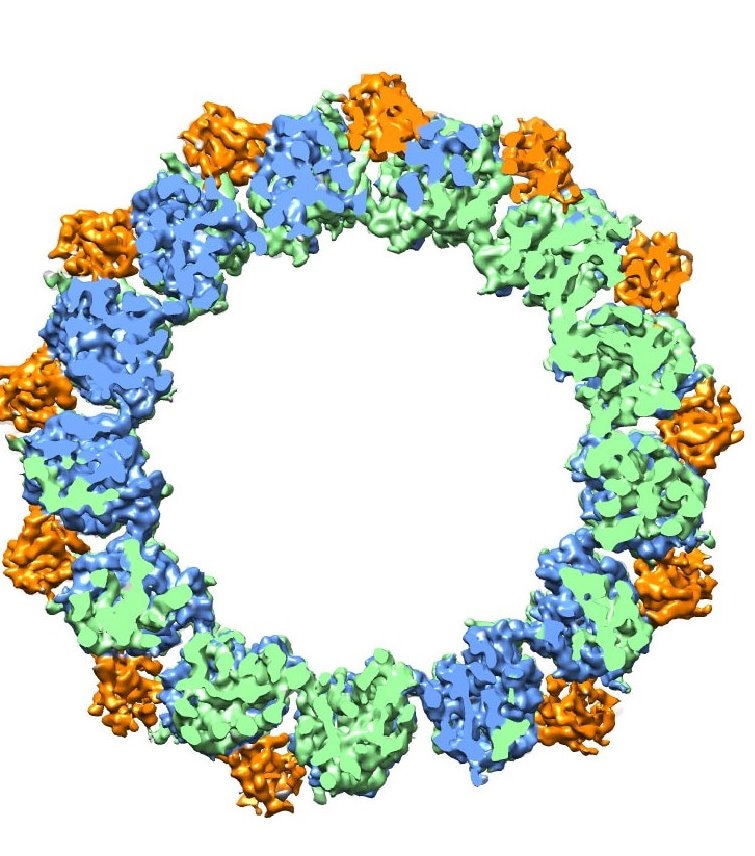Oct 17 2016
 High-resolution cryoEM imaging and a unique analysis tool enabled this image of a microtubule, a hollow cylinder with walls made up of a mix of tubulin proteins. (Credit: Berkeley Lab)
High-resolution cryoEM imaging and a unique analysis tool enabled this image of a microtubule, a hollow cylinder with walls made up of a mix of tubulin proteins. (Credit: Berkeley Lab)
A workshop on “Future Electron Microscopy” held on 11th October, 2016 at the ALS User Support Building demonstrated the depth and breadth of electron microscopy at Berkeley Lab.
The workshop not only highlighted the latest advancements made in imaging a wide variety of biological samples and materials at atomic and near-atomic scales, but also emphasized the numerous opportunities that can develop from integrating capabilities across the Laboratory.
The pioneering history of the lab in offering the most advanced in atomic resolution electron microscopy (EM) was chronicled in the one-day workshop. It also featured 12 presentations on science facilitated by a variety of electron microscopy-based methods, including atomic-resolution tomography, low energy electron microscopy, cryoTEM (transmission electron microscopy at cryogenic temperatures), and in situ microscopy techniques.
The benefits of the varied abilities at Berkeley Lab to the field of electron microscopy were also highlighted by six presentations on high-speed electron detectors, ultrafast electron sources, algorithm and supercomputing.
The workshop was launched with the objective of detecting gaps in technologies, discovering synergies among various research areas, and identifying future growth areas, by Deputy Director, Horst Simon.
What we really want to get out of this workshop is to find new ways that we can work together … and what we should be doing but that we’re not doing.
Horst Simon, Deputy Director, Berkeley Lab
Simon pointed out that many Lab scientists who have won awards and recognition from the Department of Energy Early Career Research Program awards, are improving upon or involved in electron microscopy. He also noted the lab’s important contributions through the Molecular Foundry’s National Center for Electron Microscopy (NCEM) to electron microscopy.
Senior lab scientist in the Molecular Biophysics & Integrated Bioimaging Division, and UC Berkeley professor emeritus of biochemistry, biophysics and structural biology, Robert Glaeser, talked about the formative period of cryoEM research, specifically the importance of freezing samples to the temperatures of liquid nitrogen to preserve them for EM studies and also to prevent damage from powerful electron beams, what is currently termed as cryoEM.
Simon also observed that the lab’s scientific expertise, its facility and experience have developed the ability to leverage and improve its potential to continue making pioneering advances in electron microscopy – a field that is gaining importance in numerous scientific disciplines.
Peter Denes, Paul Adams, and Andy Minor organized the workshop. Paul Adams who is the Director of the Molecular Biophysics & Integrated Bioimaging Division observed that the latest revolution in the field of electron microscopy for biosciences has created several new opportunities of research and interesting synergies with several non-biosciences programs at the Berkeley Lab.
Director of the National Center for Electron Microscopy in the Molecular Foundry, Andy Minor, observed that the latest developments in EM have moved the atomic-scale resolution from 2D to 3D. He also noted that the advancement of new and fast detectors has facilitated the direct mapping of imaging methods and properties that were not available before.
Developing the capability to provide users the best resolution at any given time scale would be a major new development for exploring dynamic processes in materials with electron microscopy.
Andy Minor, Berkeley Lab